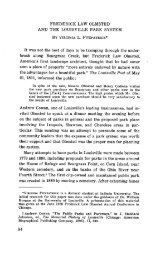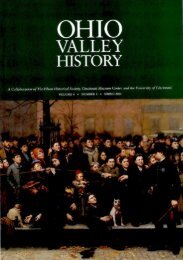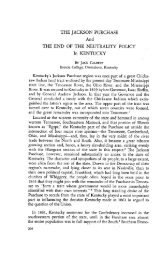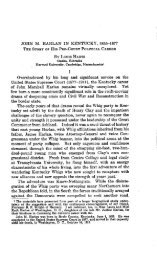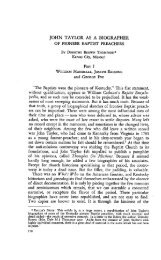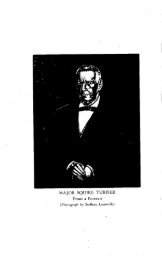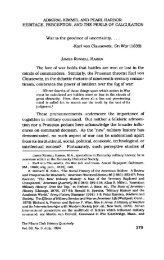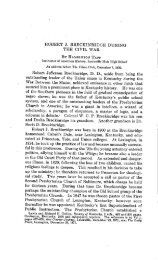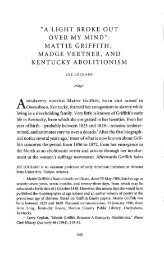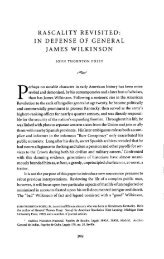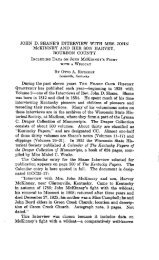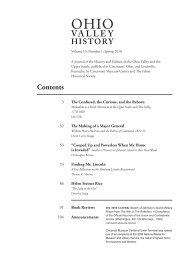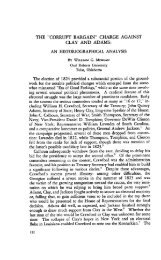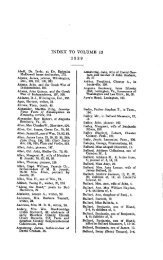NOTES AND DOCUMENTS KENTUCKY'S SLAVE IMPORTATION ...
NOTES AND DOCUMENTS KENTUCKY'S SLAVE IMPORTATION ...
NOTES AND DOCUMENTS KENTUCKY'S SLAVE IMPORTATION ...
Create successful ePaper yourself
Turn your PDF publications into a flip-book with our unique Google optimized e-Paper software.
<strong>NOTES</strong> <strong>AND</strong> <strong>DOCUMENTS</strong><strong>KENTUCKY'S</strong> <strong>SLAVE</strong> <strong>IMPORTATION</strong> LAW INLYON COUNTY: A DOCUMENTCHRISTOPHF• WkLDPmPIn 1849 Kentucky's General Assembly allowed the importationof slaves into the commonwealth, repealing its ineffective 1833law banning slave importation. But while the new law allowedthe importation of slaves, it required importers to swear thattheir human chattels were for their personal use, not for resale.Legislators set a $600 fine for each slave traders brought intothe state "as merchandise." Any Kentuckian selling slaves withinfive years of bringing them into the state faced the samefine as slave traders. To encourage vigilance, legislators decidedthat half the fine would go to the informant. They further requiredcounty court clerks to keep books so that importers ofslaves could list their imports and swear they were not speculatingin human flesh. 1If extant these books would present a valuable picture ofKentucky's slave trade. But thus far only the ledger in LyonCounty has surfaced at Kentucky's Department for Librariesand Archives. Lyon County is not typical even of Kentucky andcertainly not of the entire South. However, while the LyonCounty record settles no historiographical controversies, it doesoffer evidence of interest to researchers for several reasons.First, a look at imported slaves suggests the existence--atleast in tiny Lyon County- of a viable slave-based economy inneed of more hands, not a society based on slave-breeding. Moreover,the record shows at least some Lyon Countians obeyingCHRISTOPHER WALDREP, PH.D., teaches history atEastern Illinois University.1 C. A. Wickliffe, S. Turner, and S. S. Nicholas, The Revised Sta•'utesof Kentucky (Frankfort, 1852), 629-31; Acts of the General Assembly ofthe Co•nmonwealth of Kentucky Passed at November Session, 1850 (Frankfort,1851), 293-94.The Filson Club History Quarterly 505Vol. 65, No. 4, October 1991
510 The Filson Club History Quarterly [Octoberbut when the opportunity arose to make a profit, he ignored thelaw and took his money.12The last slaveholder recorded in the importation documentswas Frances Lyon, a middle-aged widow living with her overseerin 1860. Lyon owned five slaves in 1860- but none of the fiveshe owned that year match the four she imported in 1858. LikeTaylor, she may have sold her slaves in violation of the law. Mostof the slaves she imported have such common names that theycannot be traced in the 1870 census. But at least one had certainlyleft the county by 1870. No black person giving his nameas Evan appears in the 1870 census.I•An attempt to limit Kentucky's black population combinedwith an assertion of state's rights to regulate slaves as commercecombined to produce an invaluable record. The tiny fragmentof data extant in Lyon County can support only tentativeconclusions. White importers of slaves preferred male fieldhands because the existing supply of slaves was inadequate tothe demand. The Hillman Brothers' use of slaves to produce ironindicates that slavery had industrial applications. At least afew of the slaves Lyon Countians imported in the 1850s remainedin the county in 1870, but most probably did not.The Lyon County data is most interesting for what it revealsabout masters' attitudes toward law. Kentucky's law served asymbolic purpose all slave holders could applaud. It asserted theright of states rather than Congress to regulate slave commerce.Slaveholders may have registered their slaves not out of wearycompliance with a troublesome regulation but in a patriotic actof defiance to the federal power. But they had less interest indetailed compliance with the statute. Several sold their slavesin disregard of the law's five-year ban on resales. Slaveholders12 Manuscript Census Returns, Eighth Census of the United States, 1860,Lyon County, Kentucky, Schedule 2--Slave Inhabitants (microfilm, KentuckyDepartment for Libraries and Archives).13 Ibid.; Manuscript Census Returns, Ninth Census of the United States,1860, Lyon County, Kentucky, Schedule 1--Free Population (microfilm,Kentucky Department for Libraries and Archives).
512 The Filson Club History Quarterly [OctoberFeby 15th 1858Frances B. LyonEvan (mulatto) 34 maleSam (black) 28 maleJim (black) 17 maleJudy (black) 17 femaleBetty (black) 15 female



